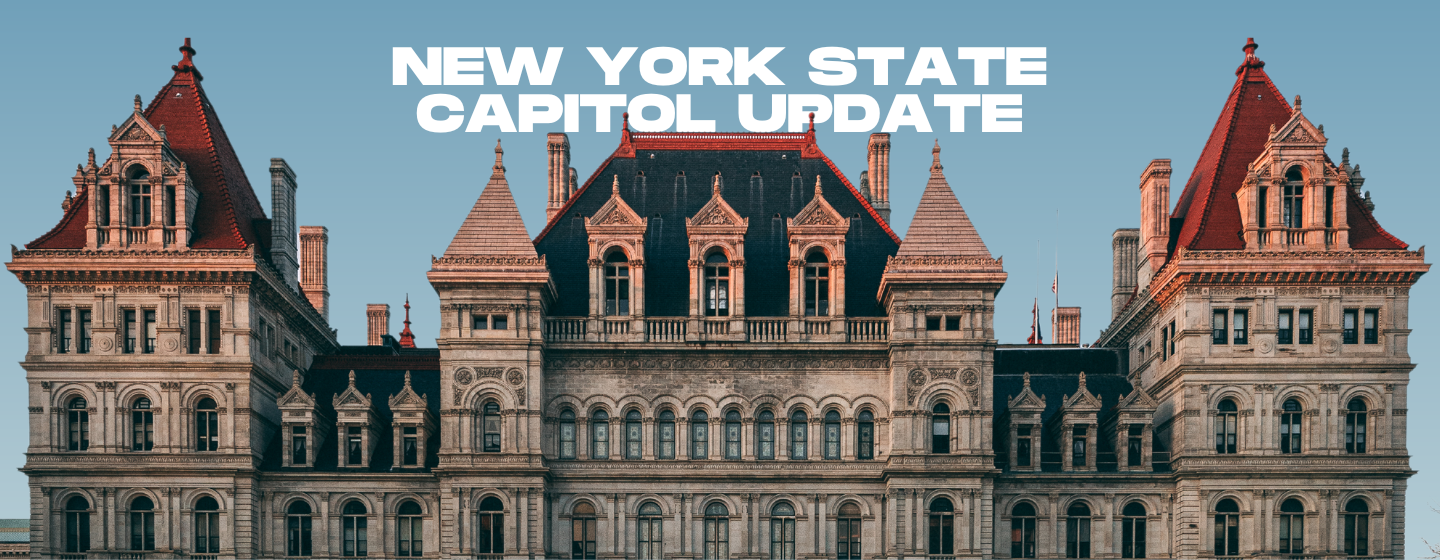Underreported Healthcare Policy and Spending in the State Budget

Dan Clark: The legislature had the week off with lawmakers taking a short break from this year's legislative session, but they're back next week for a final round of hearings on the state budget. In the meantime, this week, we've got a few updates from the Capitol. An interview with Assembly Republican leader Will Barkley and more.
Last week we told you about the latest with Governor Hochul’s nominee for Chief Judge. The nominee, Hector LaSalle, was rejected last week by the Senate. A lawsuit over how Democrats initially tried to do that appears to be moving forward, but Governor Hochul said this week that she doesn't expect to pick a new nominee until after the state budget deadline at the end of March.
Kathy Hochul: I knew that if my nominee was not successful, that this was going to set us back, and the Senate seems to be okay with that. So, yes, we have some catch-up to do, because in the meantime, we have a divided court and it's a 6-6 court. I'm anxious to get that filled, but it's going to take the time required, so the budget will be done before then I suspect.
DC: More on that when it happens.
Dan Clark: Staying at the state capitol. Members of the Black, Puerto Rican, Hispanic, and Asian Legislative Caucus held their annual winter conference in Albany last weekend. For those who don't know, the caucus has a lot of political power in Albany. They led the charge on criminal justice issues in recent years, but their legislative agenda is a lot more than that.
This year it includes a push for more funding for safety net hospitals in the state budget. Those are hospitals that primarily serve low-income communities where many residents are either on Medicaid or uninsured altogether. In New York City, they serve about half the city's population, according to lawmakers. Most patients, they say, are from communities of color.
When those hospitals don't have enough resources, funding or staff, that can have a disproportionate impact on the state's most marginalized communities. Caucus members say Governor Hochul’s proposed budget plan is at least $700 million short on funding for those hospitals and they want to see a deeper investment from the state.
Assembly Member Karines Reyes, who's actually a registered nurse herself, had this to say.
Karines Reyes: The money is not there to continue to serve the community and we need to start ensuring that our safety net hospitals survive. If they close, if the hospitals in our communities close, the impact on the health of our communities is going to be so detrimental that there won't be enough resources in our state to compensate for it.
DC: Some lawmakers say that safety net hospitals should get a boost of at least $1 billion in the budget.
Dan Clark: Introducing a new segment, we're calling New York by the Numbers. It's a segment we're going to use to tell you about something at the Capitol using a number this week. That number is 8.5.
You might remember last year when human service workers were seeking more funding from the state. Those are workers spread across a bunch of fields, including care for people with disabilities, certain mental health care workers, and more. In last year's state budget, they got a funding bump of 5.4%, which was about half of what they asked for. That brings us to 8.5.
That's how much more funding those workers want to see in this year's state budget to raise wages higher for staff to combat turnover and keep up with inflation. Senator John Mannion, a Democrat, chairs the Senate Committee on Disabilities.
John Mannion: They should not have to make decisions about providing for their family and providing care that’s based on trust, that's based on respect, that's based on relationships. It is a vocation for our DSPs, and we have left them behind.
DC: Governor Hochul’s budget plan includes a 2.5% increase, which workers say is not enough.
Dan Clark: Sticking with health, advocates are asking Governor Hochul and the legislature to undo a Cuomo-era Medicaid change that they say will end critical services for underserved communities. It's a bit wonky and in the weeds, but three years ago, the state was trying to find ways to cut costs in Medicaid.
One change that was approved would affect community healthcare providers under a federal program called 340B. That program allows those providers to get prescription drugs at a discount as long as they use those savings to provide more services to their communities.
The state wants to make a change in Medicaid that would end that and then try to fill that gap some other way. They say it will save the state money and make the Medicaid program more efficient and easier to navigate for beneficiaries. The thought is that if it saves the state money, some of it could be reinvested in those communities, but that's not guaranteed. The change is set to take effect on April 1st. Senate Health Chair Gustavo Rivera says he wants to stop that from happening.
Gustavo Rivera: The impact that it would have on the providers who use this program as a way to save money and more importantly, invest those savings into the lives of vulnerable populations. It made all the difference. It is the reason why, for the entirety of this, since this was proposed, I have opposed it and I will continue to oppose it.
DC: We'll let you know if anything changes there.
Watch the Video
Get the latest updates from the State Capitol on health care policy and state budgeting.


